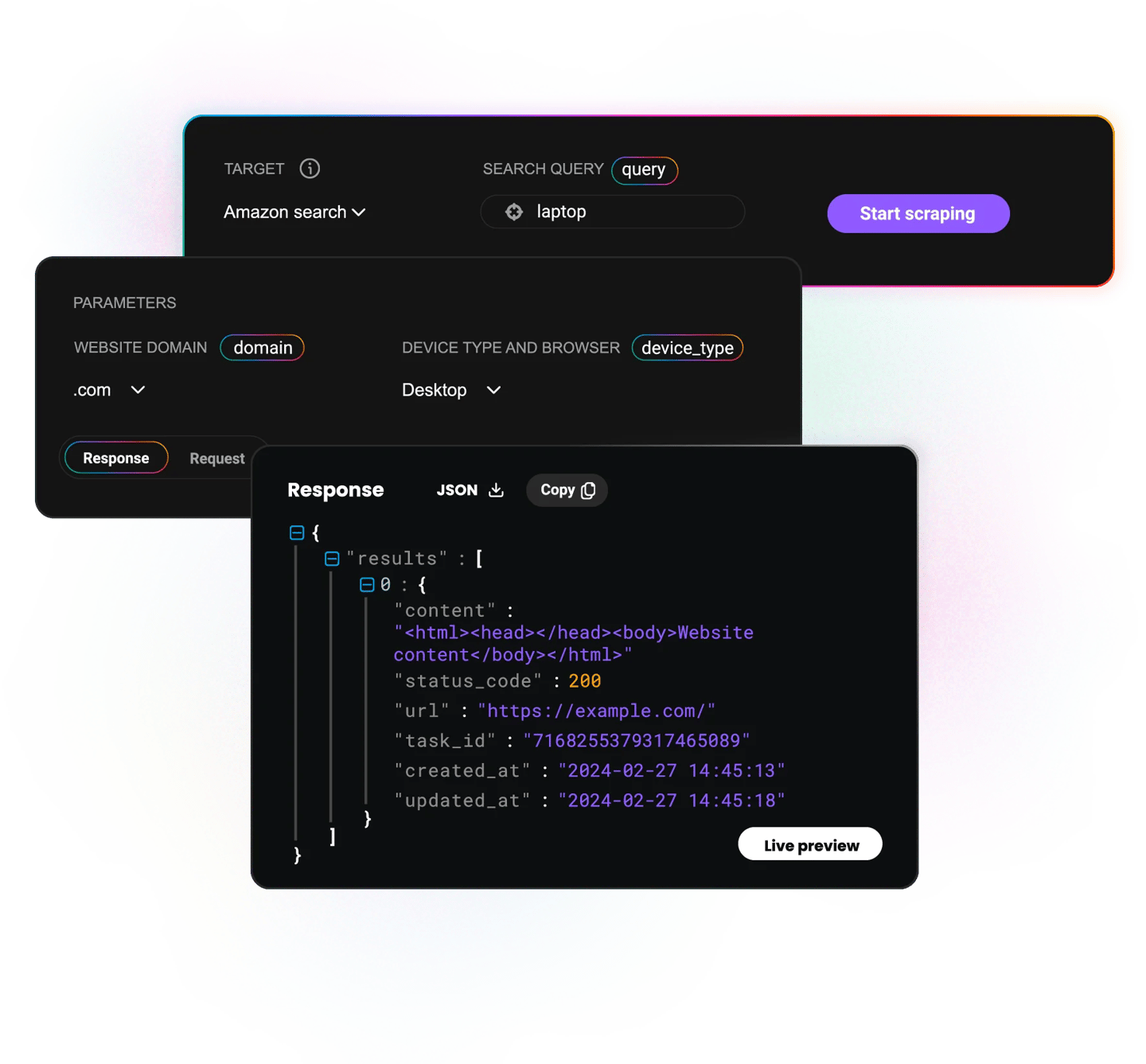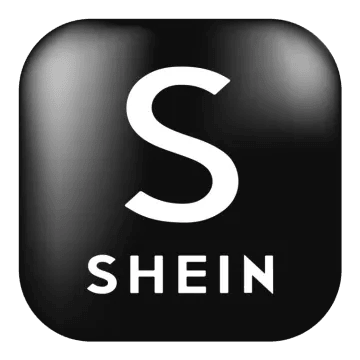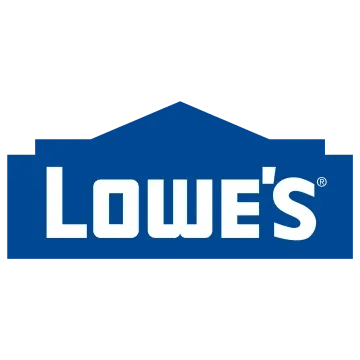eCommerce Scraper API
Get hyper‑localized product data in 195+ locations with the eCommerce Scraping API*. All the real-time data without IP blocks, with pay‑per‑successful‑result pricing, and infrastructure costs that shrink as you scale.
* This scraper is now a part of Web Scraping API.
200
requests per second
100+
ready-made templates
100%
success rate
195+
locations worldwide
7-day
free trial
Trusted by:
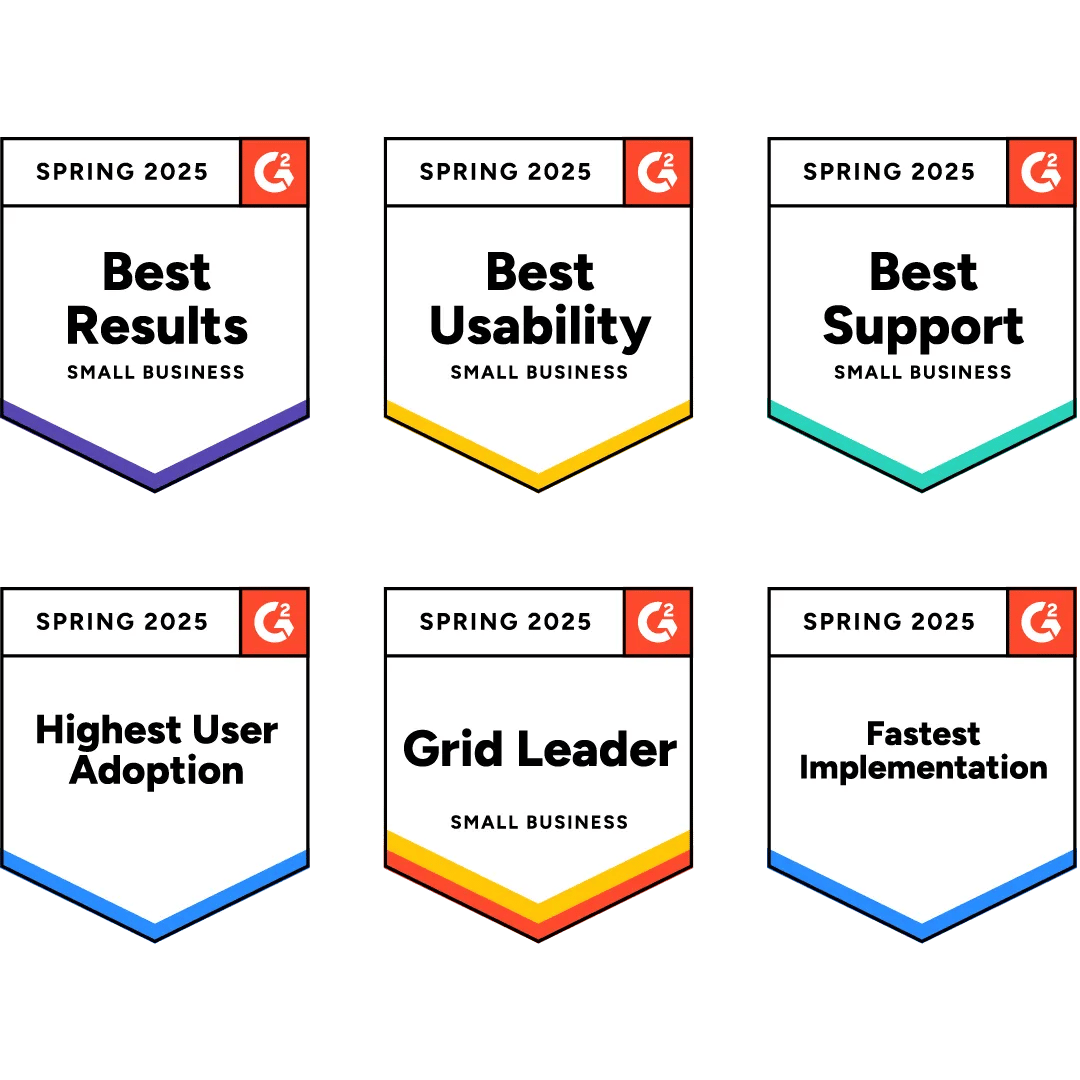
Awarded web data collection solutions provider
Users love Decodo’s Web Scraping API for exceptional performance, advanced targeting options, and the ability to effortlessly overcome CAPTCHAs, geo-restrictions, and IP bans.
Unlock real-time eCommerce insights with our scraper API
Discover the many ways our eCommerce Scraper API can help your unique projects. See how it can simplify and scale your data collection effortlessly.
Price monitoring
Track product prices across multiple online stores to ensure competitive pricing or identify trends.
Competitor analysis
Gather insights on competitors' product offerings, pricing strategies, and promotions.
Market research
Analyze market trends, customer preferences, and emerging opportunities with accurate, up-to-date data.
Inventory tracking
Monitor stock levels across online retailers to optimize supply chain and inventory planning.
Catalog building
Aggregate detailed product information, including descriptions, images, and specifications, for use in your own online store or database.
Dynamic pricing
Implement real-time pricing strategies by pulling competitor data at regular intervals.
Brand protection
Identify unauthorized sellers or counterfeit products by monitoring marketplaces.
AI & LLM training
Get real-time data from any website and train your AI-powered tools effortlessly.
Marketing intelligence
Monitor which products competitors are advertising, the placements, and the best-performing campaigns.
Test drive our eCommerce Scraping API
Scraping eCommerce platforms has never been easier. Get a taste of what our eCommerce scraper is capable of right here and now.
Why the scraping community chooses Decodo
Decodo
Manual data collection
Other APIs
125M+ residential, mobile, datacenter, and ISP proxies
Manage proxy rotation yourself
Limited proxy pools
Advanced browser fingerprinting
Build CAPTCHA solvers
Frequent CAPTCHA blocks
Only pay for successful requests
Handle retries manually
Pay for failed requests
100+ ready-made scraping templates
Maintenance overhead
Complex documentation
Data in JSON, CSV, HTML, and Markdown formats
Days to implement
Limited output formats
Scrape eCommerce websites without a single restriction
Collect real-time data for your market research, monitor dynamic pricing, and competitor developments with just a few clicks. Choose your target, like Amazon or Walmart and get data in your preferred format.
Discover our eCommerce scraping templates
Explore our extensive template library for all your scraping needs.
- All
- Amazon
- Target
- Walmart
Collect structured market data effortlessly, at any scale
Cut time on web scraping with flexible data outputs, on-demand results, and ready-made scraping templates.
Flexible output options
Choose HTML, JSON, Markdown, or table format results to suit your unique project and workflows.
Task scheduling
Set up scraping tasks in advance and receive email notifications when they’re complete.
Easy integration
Connect quickly with code examples on GitHub, Postman collections, and our step-by-step quick start guide.
Real-time or on-demand results
Fetch data synchronously in real-time or asynchronously on demand.
Advanced anti-bot protection
Use built-in browser fingerprints and advanced anti-bot measures for smooth, uninterrupted scraping.
Ready-made scraping templates
Get instant access to real-time data using our 100 pre-built scraping templates.
Start using our eCommerce scraping tool in seconds
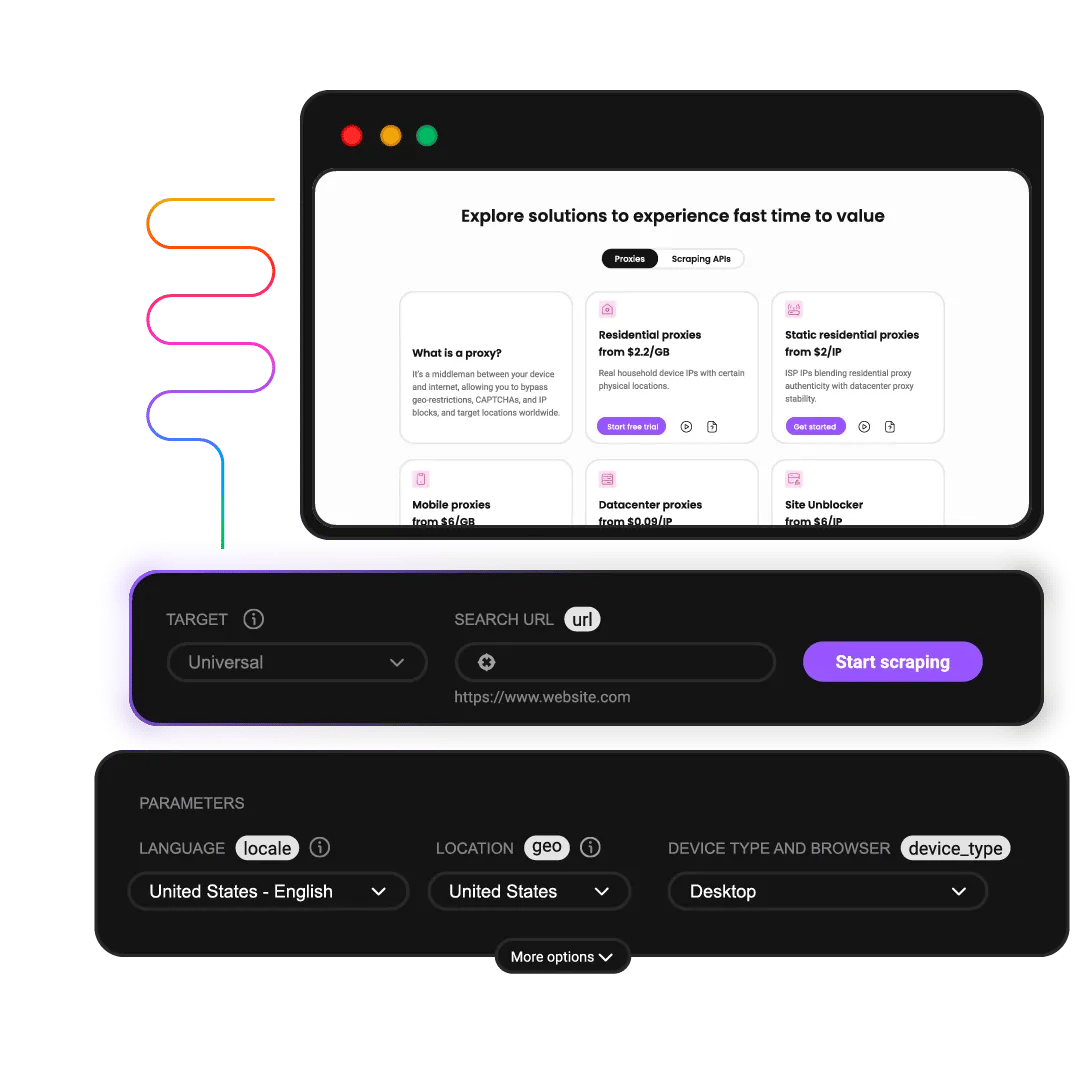
Ready-made scrapers
You focus on the project, we’ll handle the data. Our ready-made, fully customizable scrapers come with optimized settings to save you time and deliver the eCommerce data you need in seconds, whether you’re targeting Amazon or other major marketplaces.
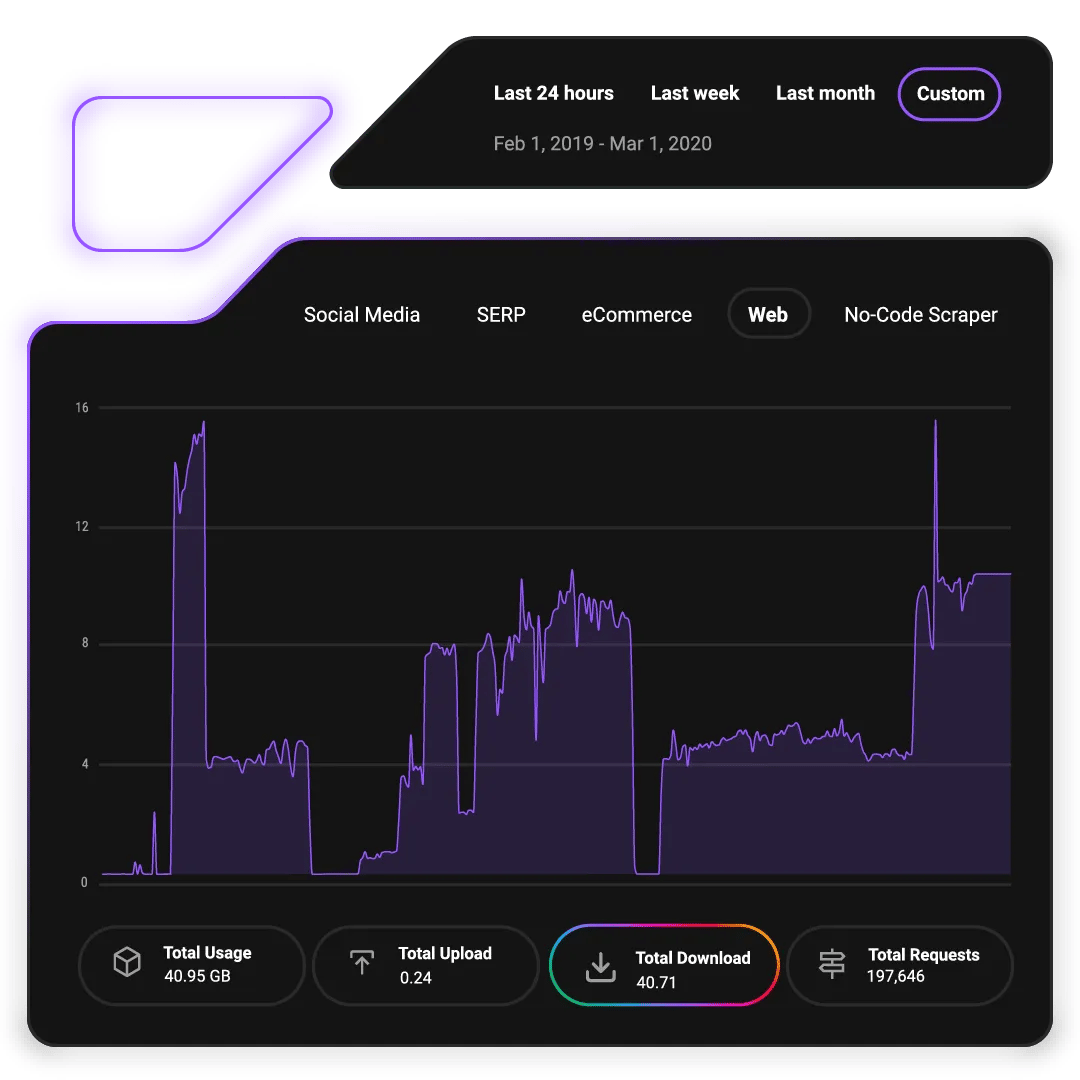
Resources for a quick start
Accelerate your setup with complete code examples in popular languages like Python, PHP, and Node.js via GitHub, or explore our step-by-step quick start guides. For even faster results, use our pre-configured scrapers to handle the heavy lifting automatically.
Explore our plans for any scraping demand
23K requests
$1.25
$0.88
/1K req
Total:$20+ VAT billed monthly
Use discount code - SCRAPE30
82K requests
$1.2
$0.84
/1K req
Total:$69+ VAT billed monthly
Use discount code - SCRAPE30
216K requests
$1.15
$0.81
/1K req
Total:$179+ VAT billed monthly
Use discount code - SCRAPE30
455K requests
$1.1
$0.77
/1K req
Total:$349+ VAT billed monthly
Use discount code - SCRAPE30
950K requests
$1.05
$0.74
/1K req
Total:$699+ VAT billed monthly
Use discount code - SCRAPE30
2M requests
$1.0
$0.7
/1K req
Total:$1399+ VAT billed monthly
Use discount code - SCRAPE30
Need more?
Chat with us and we’ll find the best solution for you
With each plan, you access:
99.99% success rate
100+ pre-built templates
Supports search, pagination, and filtering
Results in HTML, JSON, or CSV
n8n integration
LLM-ready markdown format
MCP server
JavaScript rendering
24/7 tech support
14-day money-back
SSL Secure Payment
Your information is protected by 256-bit SSL
What people are saying about us
We're thrilled to have the support of our 130K+ clients and the industry's best
Attentive service
The professional expertise of the Decodo solution has significantly boosted our business growth while enhancing overall efficiency and effectiveness.
N
Novabeyond
Easy to get things done
Decodo provides great service with a simple setup and friendly support team.
R
RoiDynamic
A key to our work
Decodo enables us to develop and test applications in varied environments while supporting precise data collection for research and audience profiling.
C
Cybereg
Find the right eCommerce data scraping solution for you
Explore our eCommerce scraping line offering and pick what suits you best, from Core to Advanced solutions, we've got you covered.
Core
Advanced
Success rate
100%
100%
Payment
No. of requests
No. of requests
Advanced geo-targeting
US, CA, GB, DE, FR, NL, JP, RO
Worldwide
Requests per second
30+
200
Output
Raw HTML
JSON, CSV, Markdown, PNG, XHR, HTML
API Playground
Proxy management
Pre-build scraper
Anti-bot bypassing
Task scheduling
Premium proxy pool
Ready-made templates
JavaScript rendering
Free trial
Learn how to set up eCommerce Scraping API
Need data instantly or prefer a more scheduled approach? No problem! Choose real-time updates or on-demand data retrieval with our synchronous and asynchronous request options.
Explore our other scrapers
What are scrapers?
Our ready-made scraping solutions simplify the process of data collection and save you time through tools built for specific targets and purposes.
SERP Scraping API
from $0.08/1K req
A comprehensive solution for extracting structured data from all major search engine results pages, complete with a proxy network, scraper, and parser. Explore SERP Scraping API
Social Media Scraping API
from $0.08/1K req
An all-inclusive solution for retrieving structured social media data at any scale and staying ahead of trends without worrying about proxies or blocks. Explore Social Media Scraping API
Web Scraping API
from $0.08/1K req
An all-in-one data collection tool, designed for targets not covered by our other scrapers, handling proxy management and eliminating the need for custom app development. Explore Web Scraping API
Frequently Asked Questions
What is eCommerce scraping?
eCommerce scraping is the process of extracting product details, image URLs, pricing, seller information, and other data from online stores using automated tools or APIs. This technique is commonly used for a variety of purposes, including price comparison, market research, inventory tracking, competitor analysis, and many others.
Can websites detect eCommerce scrapers?
Yes, basic scrapers can be easily detected through methods like IP tracking, request pattern analysis, and anti-bot technologies. However, our advanced Web Scraping API is designed to bypass these challenges. It employs features like dynamic proxy rotation, CAPTCHA-bypassing mechanisms, and other anti-bot bypassing features.
How do I scrape data from an eCommerce website?
There are 2 main approaches to scraping data from an eCommerce website – building your own scraper or using a ready-made solution. Building your own scraper requires programming skills, knowledge of web scraping techniques, and the ability to handle challenges like anti-bot systems and data formatting. This can be time-consuming and complex.
Alternatively, you can use our Web Scraping API, which simplifies the entire process. It automates data extraction, handles anti-scraping measures, and provides clean, structured data. Best of all, it requires little to no coding expertise, making it an ideal solution for developers and non-developers alike.
Which API is best for eCommerce websites?
The best API for eCommerce websites depends on your specific requirements, such as the volume of data you need, the frequency of updates, and the complexity of the website you're targeting. An ideal API should offer real-time and scalable data extraction, robust anti-blocking features, easy integration with your existing systems, and support for multiple data formats.
Our eCommerce Scraping API ticks all of these boxes. It provides reliable real-time and on-demand data extraction, handles millions of requests effortlessly, and includes advanced anti-detection mechanisms. With user-friendly documentation and seamless integration, it's a powerful, flexible solution for businesses of any size.
What product data does eCommerce Scraping API return?
Our eCommerce Scraping API returns comprehensive product data to power your business decisions. This includes essential information like product titles, seller names, brand details, and full product descriptions. You'll also get pricing data, including initial prices, sale prices, and currency information, along with availability status and stock levels.
The API captures customer engagement metrics such as review counts, ratings, and review summaries. For product identification and inventory management, it provides ASIN codes, SKU numbers, and product IDs. You'll receive complete product specifications, features, and technical details, plus image URLs for product photos and variations. Additional data includes shipping information, product categories, variant options (sizes, colors), and seller ratings.
How does eCommerce Scraping API handle large-scale projects?
Our eCommerce Scraping API is built to handle large-scale projects with ease. It supports millions of requests per day, ensuring smooth and reliable data extraction even during peak demand. With unlimited bandwidth, you'll never have to worry about data caps slowing your progress.
The API is backed by a scalable infrastructure, allowing it to dynamically adjust resources as your project grows, ensuring consistent performance. Additionally, it guarantees 99.99% uptime, so you can rely on uninterrupted data access at any time. These features make it an ideal solution for handling high-volume, complex data extraction needs.
All-In-One Solution for Scraping eCommerce Marketplaces
Gather structured eCommerce data at any scale without worrying about proxies or blocks.
14-day money-back option
